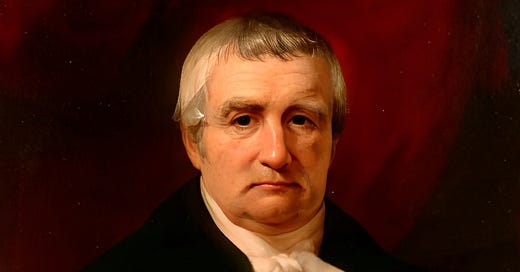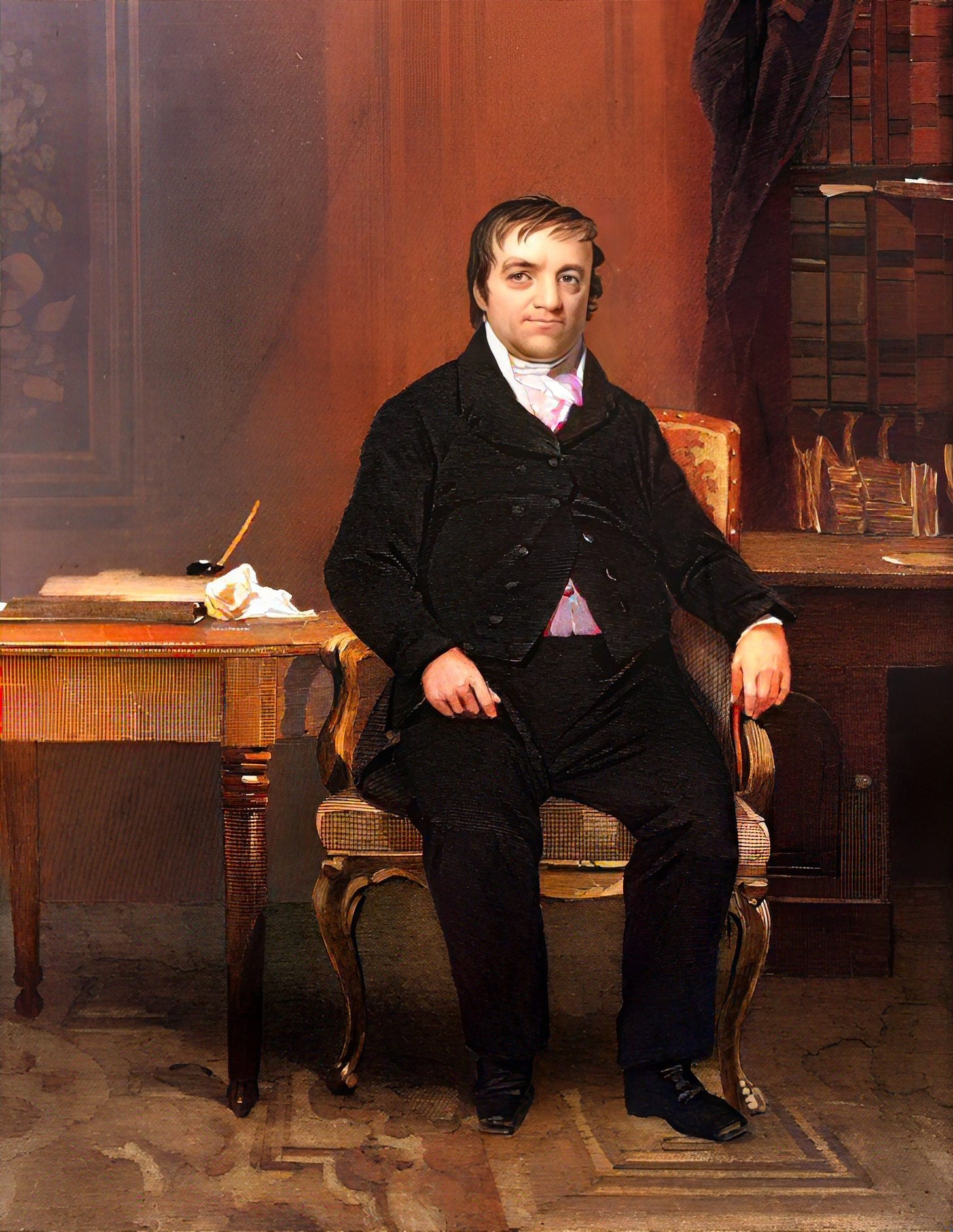March 29 - The Original American Tycoon: John Jacob Astor's Life of Fortune
Navigating Wealth: A Modern Take on Eternal Riches
This is the day John Jacob Astor, the first multi-millionaire businessman in the United States, died in 1848.
In today's devotional, we will explore the nuanced relationship between wealth and spiritual well-being through the lens of both history and scripture. How does our current affluence compare to the riches of the past, and what does this mean for our spiritual journeys? Delve into the wisdom of Matthew 19:24 as we examine the spiritual challenges that wealth can pose, not just for the likes of John Jacob Astor but for anyone navigating the comforts of modern life.
"Again I tell you, it is easier for a camel to go through the eye of a needle than for someone who is rich to enter the kingdom of God.”" - Matthew 19:24 (NIV)
This Date in History
On March 29, 1848, the American landscape of entrepreneurship and wealth witnessed the end of an epoch with the passing of John Jacob Astor, the nation's first multi-millionaire, whose ventures had significantly sculpted the economic and urban contours of the United States. Born in 1763 in the small village of Walldorf, Germany, Astor's narrative is a profound illustration of the American Dream, embodying the raw pursuit of prosperity and the crafting of a legacy through foresight, determination, and a dash of audacity.
Astor's journey into the annals of American capitalism began shortly after his arrival in the United States after the American Revolution. With an acute sense of opportunity, Astor entered the fur trade at a time when the demand for beaver pelts in Europe was surging. This venture capitalized on the untapped natural resources of North America. Through strategic alliances, Astor's American Fur Company swiftly dominated the trade, expanding its reach to the untouched frontiers of the Pacific Northwest.
However, Astor's ambitions were not confined to the fur industry. Perceiving the burgeoning potential of New York City, he diversified his interests into real estate, amassing significant holdings that would exponentially inflate in value. His investments laid the groundwork for what would become some of the most coveted property in the world, effectively making him one of the wealthiest individuals of his time.
John Jacob Astor's passing in 1848 marked not just the end of his life but the beginning of a legacy that would echo across generations. Astor's estate, valued at over $20 million—a staggering sum at the time—was a testament to his unparalleled success and strategic foresight. His will notably allocated funds for the establishment of the Astor Library in New York City, a significant gesture that underscored his belief in the power of knowledge and philanthropy. This institution, eventually merging into what is now the New York Public Library, exemplified Astor's enduring impact on the cultural and educational landscape of the city.
John Jacob Astor's impact stretches well beyond business and philanthropy, encapsulating the grand story of American growth, creativity, and the intricate correlation between personal drive and collective progress. Rooted in the soil of early American capitalism, Astor's enduring influence prompts ongoing discussions about the essence of wealth, its inherent duties, and its capacity to shape societies and urban landscapes. His endeavors, both in commerce and charity, didn't just carve out his own place in American history; they set the stage for subsequent generations to further develop and expand.
Historical Context
The early 19th century was a period of profound transformation in the United States, marked by rapid economic expansion, territorial growth, and the burgeoning spirit of American exceptionalism. In this era, the country was witnessing the early stages of the Industrial Revolution, which brought about significant changes in production, transportation, and communication. This revolution paved the way for entrepreneurs like John Jacob Astor to capitalize on emerging opportunities and navigate the complexities of a rapidly changing economic landscape.
Simultaneously, the concept of Manifest Destiny began to take root, embodying the belief that the expansion of the United States across the American continent was both justified and inevitable. This philosophy not only influenced the nation's territorial expansion but also shaped its economic ambitions, driving individuals and companies to seek new frontiers of wealth and opportunity. Astor's ventures, particularly in the fur trade and real estate, mirrored this national ethos, demonstrating how individual ambition could align with broader national objectives.
Moreover, the early 1800s saw New York City evolving from a modest urban center into a burgeoning metropolis destined to become a global economic hub. Astor's strategic real estate investments in Manhattan were both a catalyst and a beneficiary of this transformation. As the city grew, so too did the value of his holdings, illustrating the symbiotic relationship between visionary entrepreneurship and urban development.
The societal mindset of the time was also characterized by a strong belief in self-made success and the virtues of capitalism. This ethos provided fertile ground for Astor's endeavors, enabling him to amass wealth on an unprecedented scale. The era was marked by a certain laissez-faire attitude towards business, with minimal governmental intervention, allowing Astor and his contemporaries to navigate and manipulate the economic landscape with considerable freedom.
Did You Know?
At the time of his death, John Jacob Astor was the wealthiest man in America, with an estimated fortune of $20 million, which is roughly equivalent to $110 billion today, making him one of the richest men in modern history.
Today’s Reflection
In 1848, John Jacob Astor, America’s first multi-millionaire, left a legacy emblematic of the peaks wealth could reach in the United States’ growing economy. His fortune, amassed through fur trade and real estate, not only signified the pinnacle of economic success but also marked the profound disparities in wealth of his era. Against this backdrop, Jesus’s words in Matthew 19:24, “It is easier for a camel to go through the eye of a needle than for someone who is rich to enter the kingdom of God,” resonate with a profound relevance, shedding light on the spiritual complexities that wealth introduces.
This scripture reflects not on the impossibility of wealth and salvation coexisting but rather on the spiritual caution wealth necessitates. It underscores a truth: wealth can often lead to a misplaced dependence, subtly shifting one’s trust from divine providence to earthly riches. This lesson is crucial as it reveals that the challenge for the wealthy is not wealth itself but how it may recalibrate one’s spiritual compass, potentially anchoring the heart to material possessions over God.
However, as society has advanced, so has our understanding of wealth, challenging us to rethink who counts as “rich” in light of Jesus’s teachings.
The democratization of luxury in the 21st century means that conveniences and technologies — such as air travel and instant global communication, once exclusive to the wealthiest — are now integral to middle-class lifestyles, broadening the definition of wealth. This shift challenges us to reinterpret the message of Matthew 19:24 in a modern context and urges a deeper spiritual introspection. It invites reflection on how these now-commonplace luxuries may bind us to worldly wealth, potentially veiling the eternal viewpoint Christ advocates.
This narrative does not seek to demonize wealth but encourages a thoughtful evaluation of how today’s relative affluence impacts our spiritual well-being and priorities in God’s kingdom. Astor’s story, symbolizing the apex of material success, mirrors our society’s tendency towards wealth, hinting at how it might influence our principles and goals.
The real challenge for believers lies not in rejecting wealth outright but in fostering an attitude that values God’s kingdom over earthly possessions. This means acknowledging the ease with which we can fall into wealth’s trap, a risk not only for billionaires like Jeff Bezos or Elon Musk but anyone whose material ambitions eclipse their spiritual journey.
The essence of living a Christ-centered life is not to eschew wealth altogether but to cultivate a heart posture that treasures God’s kingdom above earthly riches. Recognizing that wealth’s allure can trap anyone, Christians must embrace a lifestyle of generosity, humility, and a steadfast focus on eternal treasures over earthly ones. It involves a deliberate shift from self-reliance to God-dependence, ensuring our material success does not overshadow our spiritual journey.
By embracing this call, we navigate the wealth and prosperity of our era with wisdom and discernment, ensuring that our lives reflect not the transient glories of worldly success but the enduring beauty of a life surrendered to God. When viewed through the lens of Matthew 19:24, Astor’s legacy challenges us to live in such a way that prioritizes the eternal over the temporary, securing our place in the kingdom of God by fostering a deep-seated dependence on Him above all else.
Practical Application
Reflect on the items and experiences in your life that are considered normal or even necessary by today's standards but would have been luxuries in Astor's time. Consider fasting from one such "luxury" for a week to gain perspective on what is truly essential for your happiness and spiritual well-being. This exercise is not about austerity but about recognizing the freedom found in simplicity and the space it creates for God in our lives.
Closing Prayer
Heavenly Father, as we ponder the teachings of Your Word and the lessons from those who have navigated wealth before us, guide our hearts towards eternal treasures. Help us to use our resources in ways that honor You and advance Your kingdom, keeping our eyes fixed on Jesus, the perfecter of our faith. In every blessing, may we find ways to bless others, walking in the humility and generosity that reflects Your love. Amen.
Final Thoughts
Our reflection today invites us to consider the true value and purpose of wealth in our lives. As we've seen through the lens of scripture and the story of John Jacob Astor, material wealth carries with it spiritual implications that demand careful navigation. By focusing on God's kingdom and finding our satisfaction in Him, we can enjoy the blessings of this life without becoming ensnared by them, living with a perspective that eternal riches in Christ far outweigh the temporary comforts of this world.
Community Engagement
Connect with our community by sharing some of your own thoughts. Feel free to use these questions as a starting point if you’d like.
What does true contentment look like in a world that constantly pushes for more?
How do modern conveniences challenge our understanding of what it means to be wealthy?
In what ways can we actively practice placing our treasures in heaven, as Jesus advised, in our daily lives?
How does your faith guide your attitude towards wealth and possessions?
In tomorrow's devotional, we’ll discover the unexpected treasures hidden beneath layers of doubt and dismissal. Venture into a narrative where overlooked barrenness blooms into invaluable richness.







Don't you think it really depends on a person's definition of "wealth"? I believe I'm rich because my faith ensures all my needs will be met. And my good health is also valuable. Walking with God has the potential to ensure good values in regards to all wealth...IMO.
Immediately before reading this, I read Chapter 2 of Tozer's Pursuit of God. He explores the same theme through the story of Abraham and Isaac. Thanks for more to think about on this subject!